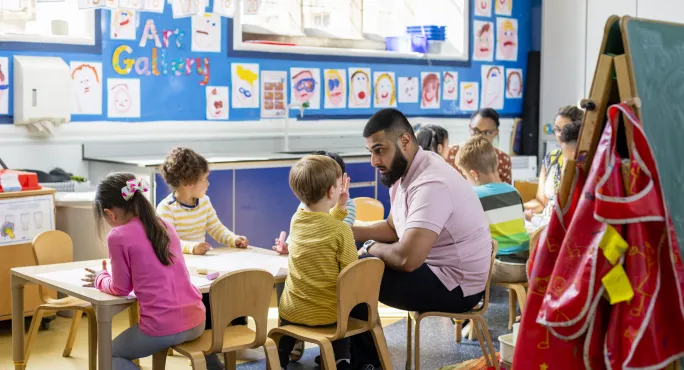- Home
- News
- Early Years
- Sats target ‘will not be met’ without more early years focus, experts warn
Sats target ‘will not be met’ without more early years focus, experts warn

The government’s key stage 2 Sats targets from 2030 will be missed without more work to support the development of these pupils in early years, ministers have been warned.
The government has set the target for 90 per cent of Year 6 pupils to be achieving the expected standard in reading, writing and maths by the start of the new decade, in both the Schools White Paper and Levelling Up White Paper published in recent weeks.
However, education experts are warning that the first pupils who will be expected to reach these targets will have gone through their early years disrupted by the Covid-19 pandemic.
- EYFS: Fears early years pupils in poverty are missing out on FSM
- Attainment: Rise in FSM pupils ‘will distort attainment data’
- EYFS: Ofsted EYFS focus needs sector knowledge
And early years leaders have told Tes that teachers are already reporting that pupils’ learning is being hampered because their speech, language and social-emotional development has been affected by the pandemic.
2030 Sats target ‘will not be met’
Early years consultant Dr Sue Allingham said the 2030 targets for literacy and numeracy will not be achieved “unless the government looks at physical and emotional development”.
Dr Allingham also criticised the existing intervention programmes as “specific” and “narrow”. She added that 2030 “is not very far away” and, “without a developmentally informed strategy, such targets will not be met”.
At a Tes panel discussion reacting to the government’s Opportunity for All Schools White Paper, Natalie Perera, chief executive of the Education Policy Institute (EPI), highlighted how the “2030 cohort of Year 6 pupils will have been born in the midst of the pandemic”.
‘Considerable impact’ on early years
Dan Morrow, chief executive officer of Dartmoor Multi Academy Trust, has also warned that the 2030 KS2 target will not be achievable without further intervention.
He told Tes his Trust is putting a huge amount of intervention into “handwriting and physical coordination” at key stages 1 and 2, “which would normally be addressed in the early years settings”.
He also warned that the need to focus so heavily on speech and language was “forestalling” work on the “foundations of later academic development”.
Without this, he warned that learning will be “built on sand”, in terms of the foundations for pupils’ cognitive development.
Mr Morrow also called for more funding for a therapist-based approach, such as an occupational or play therapist, “to ensure children are gaining the skills of socialisation, confidence and self-esteem”.
As a result of the pandemic, the chief executive said he has seen a “considerable impact on 2- to 5-year-olds…in terms of speech and language and social-emotional communication skills”.
In 2020, the Department for Education funded the rollout of the Nuffield Early Language Intervention (NELI) to help 4- to five-year-olds catch up on speech, language and communication skills.
And it has now launched a new contract worth up to £800,000 for a provider to run 18 Early Years hubs.
Simon Kidwell, principal of Hartford Manor Primary School and Nursery in Cheshire, said his school was hiring a speech and language therapist using the catch-up funding allotted by the DfE.
However, both Mr Kidwell and Mr Morrow felt “greater flexibility” around how schools can use tuition funding would be useful.
Mr Kidwell said his school had also “tweaked” its KS1 curriculum to help pupils who have missed out on the “vital foundations” in early years.
“You don’t realise how much groundwork goes on at foundation stage until you’ve got those gaps.”
Mr Kidwell said he foresaw another “three to four years where children had speech, language and social development gaps”.
One early years adviser to a large local authority, who asked to remain anonymous, said the government has failed to acknowledge that the “prime areas”, such as language development, physical and social development, “underpin later learning”.
She added that, if the DfE hoped to achieve the “ambitious targets” by 2030, there needed to be the “most support” at this level in early years.
She told Tes that many teachers were reporting children being held back in their progress by speech and language development as well as their social-emotional development and mental health difficulties.
The council adviser also said that the government needed to address a growing recruitment crisis for level 3 practitioners in early years, which was now at “catastrophic levels” in many areas, to be able to direct the right resources to address the developmental needs of young children.
Disadvantage gap should be addressed ‘early on’
Dr Sara Bonetti, director of early years at the EPI, said the White Paper “should have contained a series of policies aimed at addressing the disadvantage gap in education, and addressing it early on.
“These large gaps were present even before the pandemic - and there is now emerging evidence that the learning and development of young children has been adversely affected in the last two years.
“Furthermore, an Ofsted report on early years and recovery found that for children in these settings, personal, social and emotional development continues to be affected.”
The DfE has been approached for a comment.
You need a Tes subscription to read this article
Subscribe now to read this article and get other subscriber-only content:
- Unlimited access to all Tes magazine content
- Exclusive subscriber-only stories
- Award-winning email newsletters
Already a subscriber? Log in
You need a subscription to read this article
Subscribe now to read this article and get other subscriber-only content, including:
- Unlimited access to all Tes magazine content
- Exclusive subscriber-only stories
- Award-winning email newsletters
topics in this article



